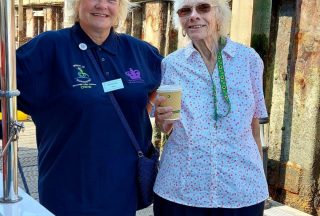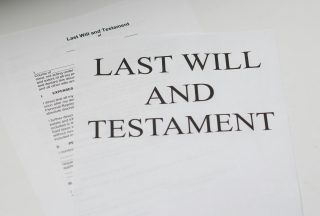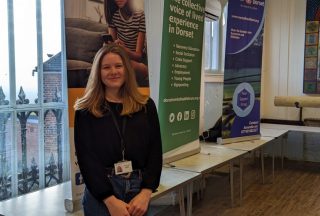I’m a full time carer to my wife Sandy, and I’m so pleased that I have the chance to talk about our experiences and hopefully help people understand a little bit about what caring for somebody with Huntington’s is like.
I started going out with Sandy in 1969. I was 17, and she was 16, so we were very young. Our first date was at a Halloween dance, (she tells me it’s been a nightmare ever since!) and we went on from there. We kept things going when I went off to university, and that was it really, looked like we were going to be stuck together ‘til the end!
In those early days, I knew that there was something wrong with her mum, I’d been up there to visit once or twice and it was quite obvious that something wasn’t quite right, she was behaving very oddly. But I didn’t think too much about it. She was diagnosed in 1970, and ironically, at that time I was studying for a degree in genetics, so I had the chance to read up all about it. I guess I did realise at that point that there was going to be a chance that this would come into our lives, but fates were sealed by that point, and we were very much together. And, when you’re that age you feel a little bit invincible and the future seems a very long way off, so I just didn’t really worry too much about it.
Sadly, Sandy’s Mum was eventually sectioned and institutionalised, as I think often happened in those days. And that was terribly sad and difficult all round. But we just got on with our lives as you do. We got married in 1973, and we were happy, both busy, working in different careers and then actually together for the same organisation. Our children James and Stacey were born in 1979, and 1982, and there we were, a busy family.
The genetic test came out in 1994, and Sandy was one of the first people to get tested. The children were really young, but we decided to tell them straight away, so they knew from the start. I have a treasured, but pretty sad, memory of us all huddling together in bed that first night we told them, so we tackled it as a family from the start. I was immediately vigilant, I was looking for signs of onset all the time. I’d done my research and thought I knew exactly what I was looking for. In actual fact, when the signs came I completely missed them.
Sandy’s first symptoms were behavioural, and we went through this awful patch when it was just unbearable. It felt as though our marriage was completely crashing, she was very hard to be around, it was really unpredictable and very difficult. With hindsight, I wish I had known that it was the onset of symptoms, because I’d have handled it differently, and probably managed to diffuse it, and get us through that period better. Instead, I reacted as an outraged husband, stood my ground and fought, claiming that it wasn’t fair to be treated like this and it just made the situation a million times worse. What also confused things was that she was going through the menopause at the time, so that made it harder to unpick too.
Anyone who is going through this will know how awful it is, but for us it did pass. Eventually, the real Sandy came back. Now, she tends to plateau for a long time, and then there is a dip. Things are progressing, of course, recently at a far faster rate than I have previously experienced. And my job looking after her is full-time.
I’ve learned to be a good carer. I’ve learned the art of patience, and I’m not perfect, some days I will forget to open the book at the patience page! It is relentless, but I do my best and it’s important to me that I do it well. You have to build a bit of a shell, and protect yourself a little bit. I can look at things quite dispassionately sometimes which helps. I read quite a lot about Huntington’s, and try to stay informed, and that way I know I’m basing my decisions and my actions around an evidence-base if you like. I find that really helpful. It’s just the way that I am but we are all different.
It’s not easy. It’s not exactly the retirement I had planned. It’s sad but true of course that plenty of spouses actually walk away. That’s not me, I made my vows to Sandy and I’m here for the long haul. Generally I’m a pretty resilient character but when I do have my dips, which is not very often and usually when I’m tired, it tends to be late at night, when the day’s caring is done. I can feel quite sad about the enormity of our situation, possibly shed the odd tear but then I just tend to have a bit of a stern word with myself and pick up and carry on. There’s not a lot of choice really!
I’m particularly good at fixing the practical things. As Sandy’s physical needs change, I’m great at sorting house adaptations, bath seats, shower rails, that kind of thing. I can take that all in my stride. And I find I cope quite well with her cognitive symptoms too actually. The bit I struggle with the most is the communication and we are losing that now really. It’s quite hard for anyone but me to understand Sandy now, and it’s not easy even for me.
We are trying out different things, the Ipad doesn’t seem to work as she’s not really techy. So we are looking at a picture board. It’s experimentation and we will find the right solution. It doesn’t seem to bother Sandy, she doesn’t get upset about it. It mostly impacts me, I don’t have proper conversation in my life day to day, and it can be quite lonely. But also partly because I miss talking to my wife. All the conversations we have had over the years, and we can’t really do that anymore. So I am grieving that part of our relationship, and that bit of her. I keep losing bits of her unfortunately, and that is hard. Fortunately her sense of humour, which is usually aimed at me, appears to be intact!
We are incredibly fortunate that our children have both tested negative. That means that our grandchildren will not be at risk either. So it will end with us. But it hasn’t been easy for our children of course. They went through the mill with me when Sandy went through the particularly bad patch. They had to think about testing. My daughter decided to have children quite young, so that Sandy could enjoy being a grandmother, which was marvelous but obviously it was a decision influenced by the Huntington’s in our family. My son seemed resolutely single for a long time, until he had his negative test result, and then he settled really quickly after that. So I think that the concern was obviously holding him back. We never really talked about it and that I regret. Once it is in the family it affects everything.
I know that the people who have it come off worse here, but what we do is a tough gig. I work really hard, my back and legs are wrecked, physically, from the lifting, and carrying and supporting. I have a really great relationship with our local Community Neurology Service but it can often be a battle with some support services, which, quite frankly I could do without! Sometimes I have to push very hard and I have no hesitation in being really clear and playing the full time carer card. I’d advise anyone in my position to do that to be honest. I find myself thinking and planning ahead a lot, what happens if something happens to me? How do we manage that as a family?
There’s a lot of stuff people don’t realise about what ‘caring’ actually means. And that’s before you even get to the emotional impact of your wife, your partner, only being able to communicate with you in single words, and knowing that one day you might not be able to give them the care they need at home. I don’t think people realise the full weight of caring responsibilities. Sandy has some professional carers come in, it used to be for 12 hours, but we’re up to 18 hours which really helps. And our carers are absolute diamonds for whom I have the greatest of respect. I don’t have any choice here but they do and I’m full of admiration. But in reality that still leaves me with 150 hours caring a week to do. If you think about it, us unpaid carers are really saving the health and social care system an awful lot of money.
Sandy has never once, to my knowledge, said, ‘Why me?’ She has taken this in her stride as far as she can. She has the love and support of her family, and some amazing, unbreakable friendships with wonderful women who care for her and have fun with her the way they always have, regardless of the Huntington’s. They are friends to me too, giving me respite, checking on me, as do my family. I think if I have advice for other people in my situation it is to reach out and get support, outside contact, people who care and who will be there through thick and thin. Even when you are pretty resilient, this can be a tough and lonely experience. My second piece of advice is not to worry about what may be around the corner and what bridges you may have to build. HD is a very complex disease so not everyone suffers in the same way (as I was once told ‘Once you’ve met one HD patient – you’ve met one HD patient!’) but I would say that you need to get as much knowledge as you can and get the necessary tools in your kitbag, so that if you do have to build that bridge then you are as prepared as you can be.
I’m really hopeful that this will help people understand what Huntington’s is like for everybody involved. Telling the stories of different people is important, and it gives a glimpse into our lives. I always say, ‘Walk a mile in my shoes… or in fact, just a couple of hours, and you might get an idea.’
Steve, age 68
If you would like information, advice or guidance on your caring role, please contact us today.



